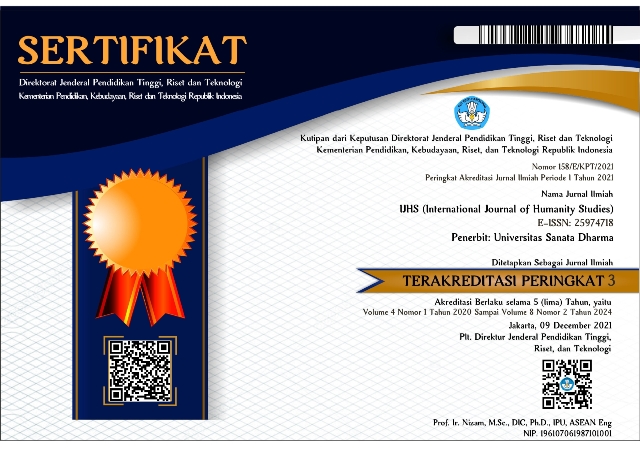FEAR OF INCESTUOUS OIDA-POUS: UNEQUAL DISCOURSES AND TRAGEDY IN OEDIPUS THE KING
(1) Sanata Dharma University, Indonesia and Driyarkara School of Philosophy, Indonesia
(*) Corresponding Author
Abstract
Keywords
Full Text:
PDFReferences
Barthes, R. (1972). Mythologies (A. Lavers, Trans.). London, England: Paladin.
Culler, J. (1981). The pursuit of signs: Semiotics, literature, deconstruction. New York, NY: Cornell University Press.
Decreus, F. (2004). Changing paradigms: Some epistemological and philosophical aspects in dealing with Oedipus Rex. Documenta, 22(4), 406-413. Retrieved from https://doi.org/10.21825/doc.v22i4.10339
Fosso, K. (2012). Oedipus crux: Reasonable doubt in 'Oedipus the King.' College Literature, 39(3), 187-209. Retrieved from https://doi.org/10.1353/lit.2012.0017
Greetham, D. C. (1999). Facts, truefacts, factoids; Or why are they still saying those nasty things about epistemology? The Yearbook of English Studies, 29, 1-17. Retrieved from https://doi.org/10.2307/3508931
Koper, P. T. (2006). Myth and investigation in 'Oedipus Rex.' Contagion: Journal of Violence, Mimesis, and Culture, 12/13, 167-185. Retrieved from https://doi.org/10.1353/ctn.0.0001
Miller, J. H. (1990). Narrative. In F. Lentricchia & T. McLaughlin (Eds.), Critical terms for literary study (pp. 167-178). Chicago, Illinois: University of Chicago Press.
Nikolarea, E. (2021). Athenian law and classical Greek tragedy: The case of Oedipus the King. Law & Literature, 33(3), 313-336. Retrieved from https://doi.org/10.1080/1535685X.2021.1991613
Ong, W. J. (1982). Orality and literacy: The technologizing of the word. London, England: Routledge.
Peradotto, J. (1994). Interrogating the canon, deposing the Tyrannus. Annals of Scholarship, 10, 1-22.
Peradotto, J. (2002). Prophecy and persons: Reading character in the Odyssey. Arethusa, 35(1), 3-15. Retrieved April 23, 2021, from https://www.acsu.buffalo.edu/~peradott/ProphecyPersons.pdf
Rorty, R. (1980). Philosophy & the mirror of nature. Oxford, UK: Basil Blackwell.
Rorty, R. (1979). Contingency, irony, and solidarity. Cambridge, UK: Cambridge University Press.
Segal, C. P. (1982). Dionysiac poetics and Euripides’ “Bacchae.” Princeton, NJ: Princeton University Press.
Smith, P., & Riley, A. (2009). Cultural theory: An introduction (2nd Ed.). Massachusetts, MA: Blackwell Publishing.
Sophocles [ca. 496-406 S.M]. (2002). Oedipus the King (OTK) (Robert Fagles, Trans.). In S. Lawall (General Editor) & M. Mack (General Editor Emeritus), The Norton anthology of world literature, Volume A – Beginnings to A.D. 100, Second Edition (pp. 617-658). New York, NY; London, England: W.W. Norton and Company.
Vernant, J-P., & Vidal-Naquet, P. (1990). Myth and tragedy in ancient Greece (Janet Lloyd, Trans.). New York, NY: Zone.
DOI: https://doi.org/10.24071/ijhs.v8i1.5452
Refbacks
- There are currently no refbacks.
Copyright (c) 2024 Lucianus Suharjanto

This work is licensed under a Creative Commons Attribution-ShareAlike 4.0 International License.
Indexed and abstracted in:
IJHS Sinta 3 Certificate (S3 = Level 3)
International Journal of Humanity Studies (IJHS) has been nationally accredited Sinta 3 by the Ministry of Education, Culture, Research and Technology of the Republic of Indonesia based on the decree No. Surat Keputusan 158/E/KPT/2021. Validity for 5 years: Vol 4 No 1, 2020 till Vol 8 No 2, 2024

This work is licensed under CC BY-SA.
Creative Commons Attribution-ShareAlike 4.0 International License.
p-ISSN: 2597-470X (since 31 August 2017); e-ISSN: 2597-4718 (since 31 August 2017)
Notice: The opinions expressed in this publication are those of the authors. They do not purport to reflect the opinions or views of the editorial team or publishers.
International Journal of Humanity Studies (IJHS) is a scientific journal in English published twice a year, namely in September and March, by Sanata Dharma University, Yogyakarta, Indonesia.

















